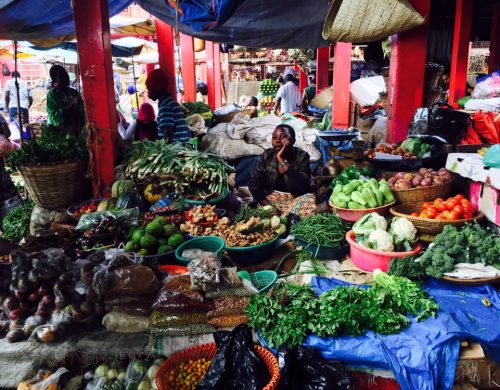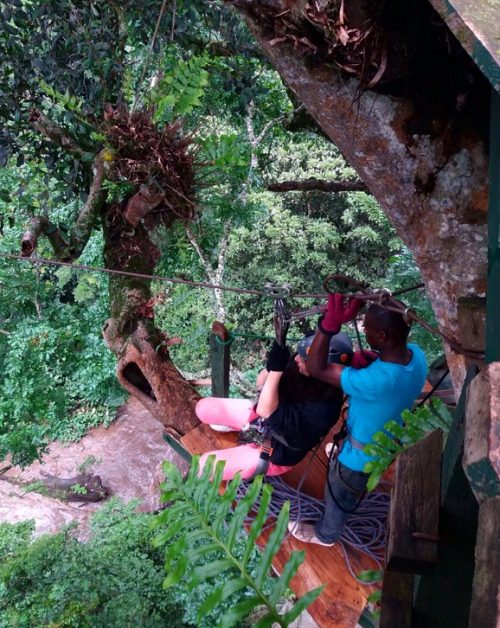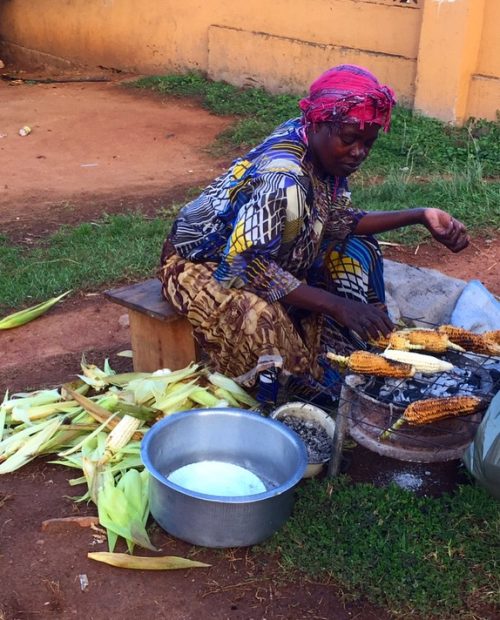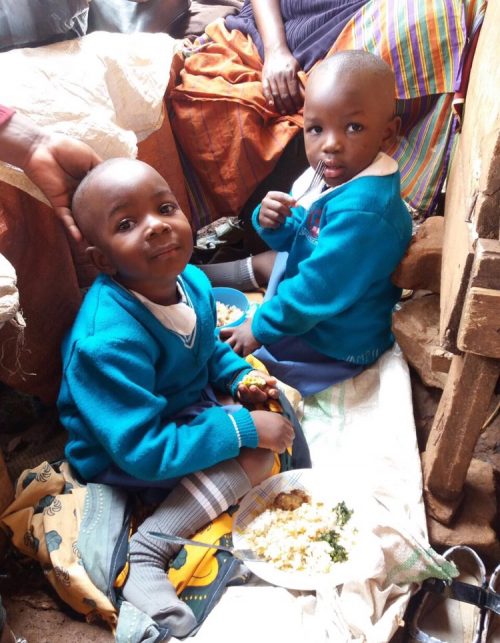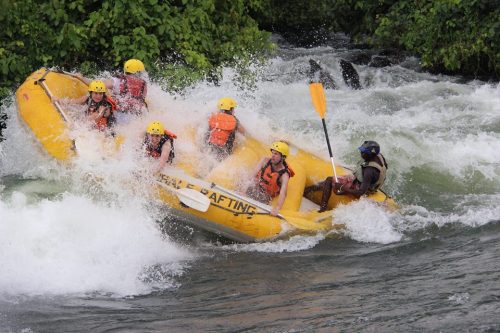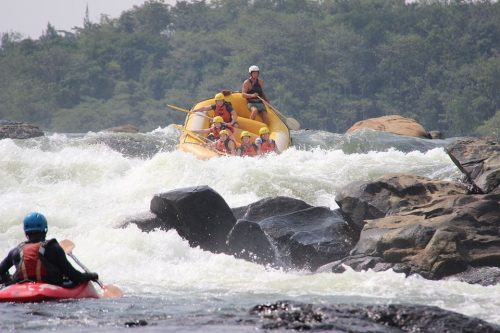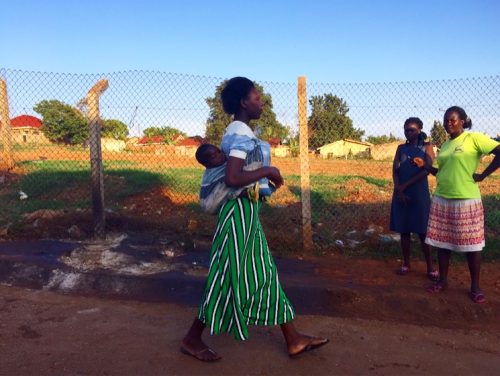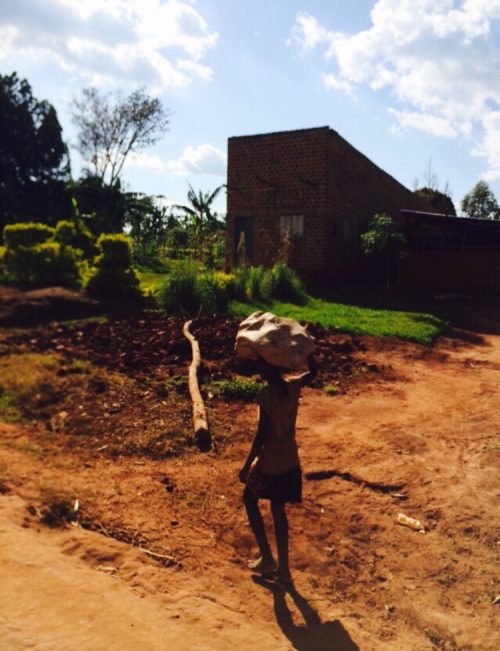Lingering over the equator line, Uganda is a good neighbor to Tanzania, Kenya, Rwanda, Democratic Republic of Congo and South Sudan. More than the border line, these countries also share a long history of political twists and turns that have left their consequences until today. Beautiful in its modesty, Uganda is ready to welcome tourists and answer their queries about its past.
As soon as I made the first step out of Entebbe international airport, I realized that even my first guess was wrong–I though it would be unbearably hot and that I will need to speed up to get to the bus that would take me to the city.
As I'm walking out, instead of a heat wave, I feel a slight breeze bringing the scent of fresh mango in the air. This is when I knew that, to experience Uganda, which is paradoxically one of the most prolific and poorest African countries, I will have to forget everything I've read about it, open my mind and feel the hot February African summer my way.
There was something warm about the look of Ms Yamamtu that made me smile instantly, when she shook my hand. ,,Welcome to Uganda”, she said without letting go of my hand, but instead bringing the other one closer, as if she wanted to seal the first greeting. She has one of those faces that seem familiar even though you know you have never met. This calm, warm feeling will not leave my body and mind for the next couple of months as I explore Uganda.
In the capital and financial center of Uganda, downtown Kampala I encounter people with smiles of hospitality and kindness drawn on their faces, warmer than the sun, here, in a country that lies on the equator, where daylight lasts 12 hours on average. Traveling the world, my starting point that we can learn best about a country and its philosophy just by observing its people, time after time is proven to be true. From an idea to a hypotheses, it becomes a theory for me – people are the core that makes the country what it is. When observing, do not focus on those holding positions and their heads high, smiling from the posters of the upcoming elections in perfect suits and ideally computed angle of a photographing profile for the future president.Land into the heart of the city and you will understand how ordinary people, ordinary as you and me, spend their working day –what are they selling, and more importantly what do they do when they don’t manage to sell anything. What do they talk about, what do they find funny, are they good at stealing customers from each other? Find yourselves stuck in traffic in the center of Kampala and you'll see how they react when they are late; when they realize that on a Friday night after a whole day at work, they will wait another 45 minutes in traffic. Open the window of your car with no air conditioning, look around you and you will understand the philosophy behind boda boda and why it is the most common means of transport in east Africa.
BODA BODA
These motorcycles transport whatever you could imagine – passengers and their not so small families or the entire furniture when they are moving. It is cheaper than paying a taxi driver, and it has the advantage over cars for its ease of avoiding crowds which makes it popular. They are as safe as they look, but present a good opportunity for young entrepreneurs and a chance to create a starting capital. Tomas is one of them, and he plans to open his own BODA BODA company as soon as he saves enough money. He promises that it will be the safest in Kampala.
,,As a driver I can see everything that could be done better. I see it, but I don’t tell it to my boss because I do not want him to steal my ideas for business”, says the 23-year-old businessman, born in eastern Jinja, the second biggest city in Uganda.
The name bodaboda originates from the roots of its original purpose – to transport passengers willing to negotiate the price from the border of Kenya to Ugandan cities. Combination of thick African accent and the speed of talking has made a shout out ,,border border” into a bodaboda we know today.
FERTILE NILE SOIL
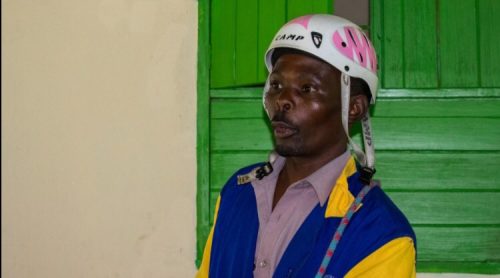
Uganda has one of the most fertile soils in the world formed around the longest river in the world – the mighty Nile. Aside from exotic safari and beautiful national parks, one of the main touristic attractions is visiting the source of the Nile at the Lake Victoria point. For those like me that like adrenaline rush, there is an organized Nile rafting tour. Day can leave you feel physically exhausted, but mentally it really takes you places. It takes 8 hours of rowing and 7 rapids with surprising turns to finish the tour and touch the grass again. Our skipper, Bosede, whose names translates from the official Swahili language to a Sunday child, has over a decade of experience with seemingly steady flows of White Nile and ,,only two accidents”. I say that one is enough, but he leaves me short of information what happened as he just adds: ,,Nothing serious enough to stop the tours”. We leave the conversation there as it was late to think again – the first rapid is just ahead of us.
Swahili and English are the official languages of Uganda. However, there is 30 more African dialects being spoken across the country and they are used against different tribes – Baganda, Basonga, Achioli, Ankole, Toro… If you thought there is many tribes and languages, imagine the number of traditional dances – the number is at least the double. In eastern region of Basoga tribe, the dance is Tamenhaibunga and it literally means ,,good friends drink together and don’t fight in case they break the gourd holding the drink”.
Probably the most recognized dance is Kiganda performed in the honour of the king of the tribe. It is considered a complicated dance as it is performed only with a drum beat and hop movement which requires great precision and talent.
HEARTBEAT OF UGANDA
There is beauty in different corners of this country. Take your pick and you won’t remain indifferent. But what made my soul crave for more was the people. As I mentioned already, there is something in the way they walk and the handshake that stays until the end of conversation. This is their deliberate way of pulling you into the moment, being a part of it no matter how insignificant it may seem to you – they remind you that you must have those few moments to gift you full attention. This may seem a bit unusual, perhaps overwhelming to us coming from different cultures where only a firm, on point, ,,manly” handshake is considered worthy. In Uganda, the strength of it is not the main thing. Ms Yamamtu explains to me, that in Uganda, a handshake is perceived as ,,handwashing”. This doesn’t extend to the philosophy of guilt releasing through the Pontius Pilates’ metaphor, but as an exchange where both sides gain. Nobody is being left out – this is why you need to be in the moment, crucial ingredient of quality exchange.
And the walk? Another unusual everyday activity for us Europeans that tend to be late even before we have made a plan. Here, women are walking bare foot or in light sandals with open toes that you can barely see only when they make a step forward and their long, colourful skirts lift an inch or two. The gait is light, slow and rhythmical. Torso doesn’t move much, the essence of the movement is in the hips. If you look up to see the shoulder and faces of Ugandan women, you will understand why this walk comes so naturally to them. Usually they don’t walk alone. They carry a baby wrapped in a scarf on their chest, and another member of the family on their back. Neck is straightened and strong, eyes focused to see the traffic, and a big basket full of fruit on their head. Key is telling me that those baskets can weigh up to 10 kilograms. She knows, it is a tradition in her family as well carried onto the youngest female teenager in the house.
CHURCHILL’S PEARL OF AFRICA AND AMIN’S UGANDA
Fifty years ago, Uganda was declared the ,,Pearl of Africa”. British Prime Minister Winston Churchill came up with this name as he planted hopes in a newly formed independent republic with a promising economy, a functioning democracy and breathtaking national parks. Once the ideal location for a safari vacation, rafting on the White Nile that widens towards Egypt, fishing on Lake Victoria shared with neighboring Kenya and Tanzania, or wandering among herds of elephants in the national park of Queen Victoria, Uganda has for the last few years intensely been working on the renewal of its tourist potential and striving to justify the epithet given by Churchill.
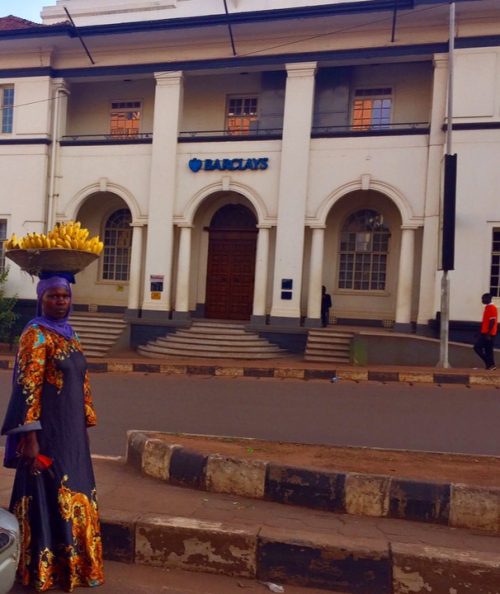 After nearly four decades of violence, political upheaval and complete economic collapse that started with precedents of the first prime minister of independent Uganda Milton Obote, and was continued during the eight-year rule of the brutal regime of Idi Amin, Uganda was quickly turning from a completely unsafe place to a life-threatening one. It is estimated that more than 300 000 people – members of the opposition the regime, Amin's government, civilians, both foreign and domestic journalists have lost their lives during Amin's government.
After nearly four decades of violence, political upheaval and complete economic collapse that started with precedents of the first prime minister of independent Uganda Milton Obote, and was continued during the eight-year rule of the brutal regime of Idi Amin, Uganda was quickly turning from a completely unsafe place to a life-threatening one. It is estimated that more than 300 000 people – members of the opposition the regime, Amin's government, civilians, both foreign and domestic journalists have lost their lives during Amin's government.
Under the watchful eye of security forces, in a small apartment somewhere in a quiet area of London, after 20 years in exile, Henri Kyemba wrote a book detailing evidence of the monstrous crimes he was witnessing serving as a member of Amin's government for 5 years before he found a way of leaving the country with his family alive. He called it ,,The state of blood”.
,,To an outsider, Amin's regime seems inexplicable. How could such a man gain and hold power?..It is not a personality to be underrated. True, he is nearly illiterate; he is politically naïve; he is violently unpredictable; he is utterly ruthless. Yet he is so jovial and generous; and he has extraordinary talents – for practical short-term actions, for turning apparent weaknesses to his own advantage, and for asserting his leadership among his thugs…” – this is how Kyemba describes Idi Amin Dada, former leader of Uganda and ex -boxing heavyweight champion, who had 5 legal wives and officially 43 children.
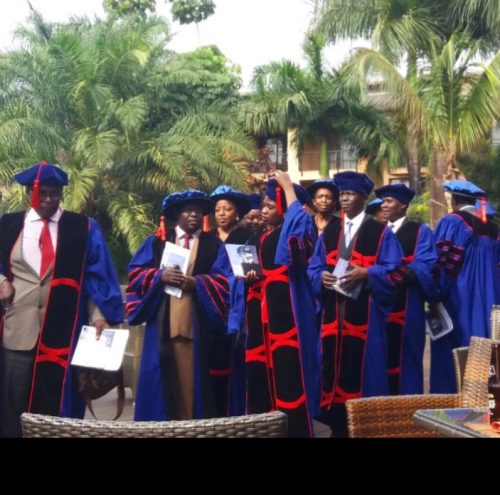 Yoweri Musevni, the current president of Uganda has been in charge of the country for 25 years. Came to power in the eighties when he formed the National Resistance Movement, which consisted mostly of the victims and orphans left by Amin’s regime. Musevni and his government are still trying to establish the rule of law that works and create a safe space for Ugandans. Although the Human Rights Committee was formed, Uganda has a long way to go to be called a free, democratic country. Again, it was targeted in 2014 as a country denying human rights and demoting free world, when homosexuality, including any form of its support is illegal and carries a sentence of two years imprisonment to a lifetime in jail.
Yoweri Musevni, the current president of Uganda has been in charge of the country for 25 years. Came to power in the eighties when he formed the National Resistance Movement, which consisted mostly of the victims and orphans left by Amin’s regime. Musevni and his government are still trying to establish the rule of law that works and create a safe space for Ugandans. Although the Human Rights Committee was formed, Uganda has a long way to go to be called a free, democratic country. Again, it was targeted in 2014 as a country denying human rights and demoting free world, when homosexuality, including any form of its support is illegal and carries a sentence of two years imprisonment to a lifetime in jail.
Ugandan Rolling Stone magazine was the target of serious criticism with human rights fighters upset all over the globe, when photos, names and addresses of 100 people ,,accused of sodomy” were published on the front page. It said ,,Hang them”.
It was not only people who have suffered through out those years: a rich fauna of wild animals has been seriously compromised because many guerrilla groups were practicing their wild life hunting hobbies with the blessing of Idi Amin and were killing wild animals typical for this part of the world. Many species were left endangered of extinction in Uganda where there natural habitat was. However, today a free and relatively politically stable Uganda is finding ways to get back in the game. In the past two years, Kampala, Jinja and national parks of the East African country were visited by close to 1.5 million tourists. It is interesting for bag packers looking for an adventure, as well as for those who adhere only to luxury and are not interested to search for ,,the essence of Africa”, but the indoor hotel complexes where you have everything you want.
Brutality continues – Even after Idi Amin time is gone, the violence has not completely left the Pearl of Africa. Notorious guerrilla group Lord's Resistance Army has been terrorizing people in northern Uganda and neighboring countries for the last two decades,. This paramilitary formation is said to be responsible for the deaths of tens of thousands of civilians, including children. It is led by the self-proclaimed leader Joseph Koni.
Smooth, rhythmic gait and perfectly gauged movements of the hips. It doesn’t seem less elegant when they are carrying the burden for the whole family on their heads or when they have a whole line of impatient taxi drivers who shout and honk coming towards them. They do not wear watches and always act like they are not rushing anywhere and are never late. I continue to observe the simple life of Uganda with a slight smile and enchanted stare so Ms Yamamtu feels the need to explain to me once again. ,,Honey, we do not need a watch. We have the time.”
Marija Rašović
 (Marija Rašović, originally from Podgorica, has a degree in journalism obtained at the Faculty of Political Sciences in Belgrade. She completed Masters in Madrid, and now lives and works in Abu Dhabi. And she travels… Her observations poured into words, esteem readers, you will be able to read here, on MNE magazine portal. )
(Marija Rašović, originally from Podgorica, has a degree in journalism obtained at the Faculty of Political Sciences in Belgrade. She completed Masters in Madrid, and now lives and works in Abu Dhabi. And she travels… Her observations poured into words, esteem readers, you will be able to read here, on MNE magazine portal. )



